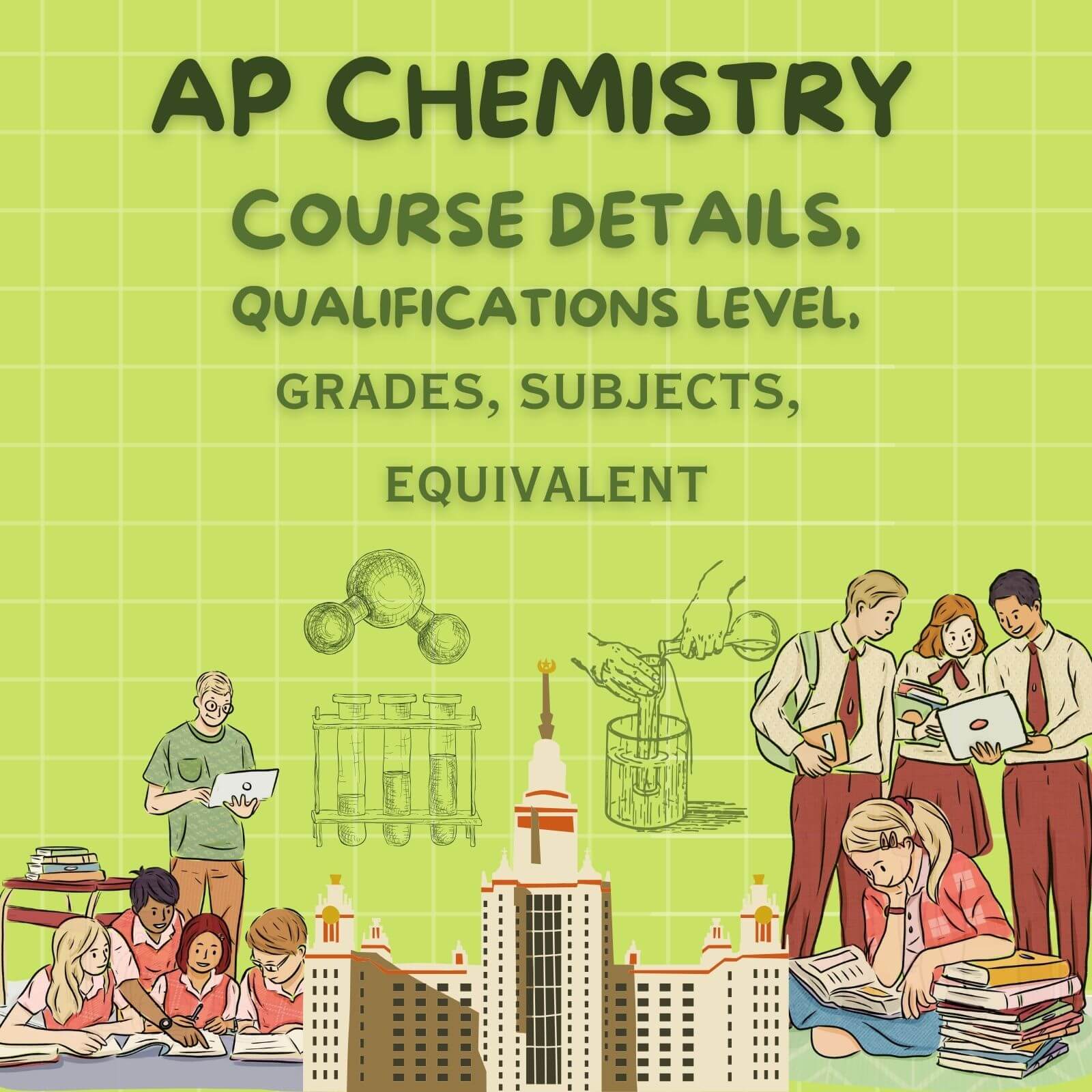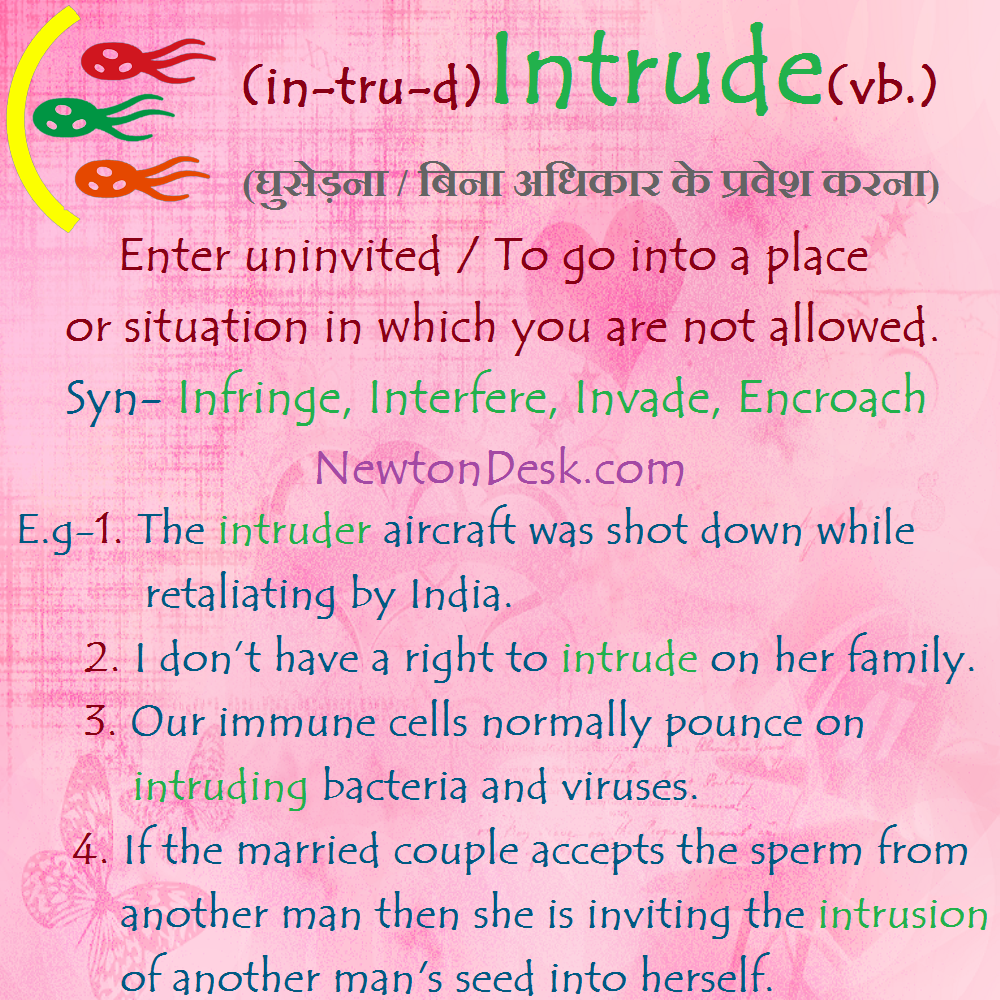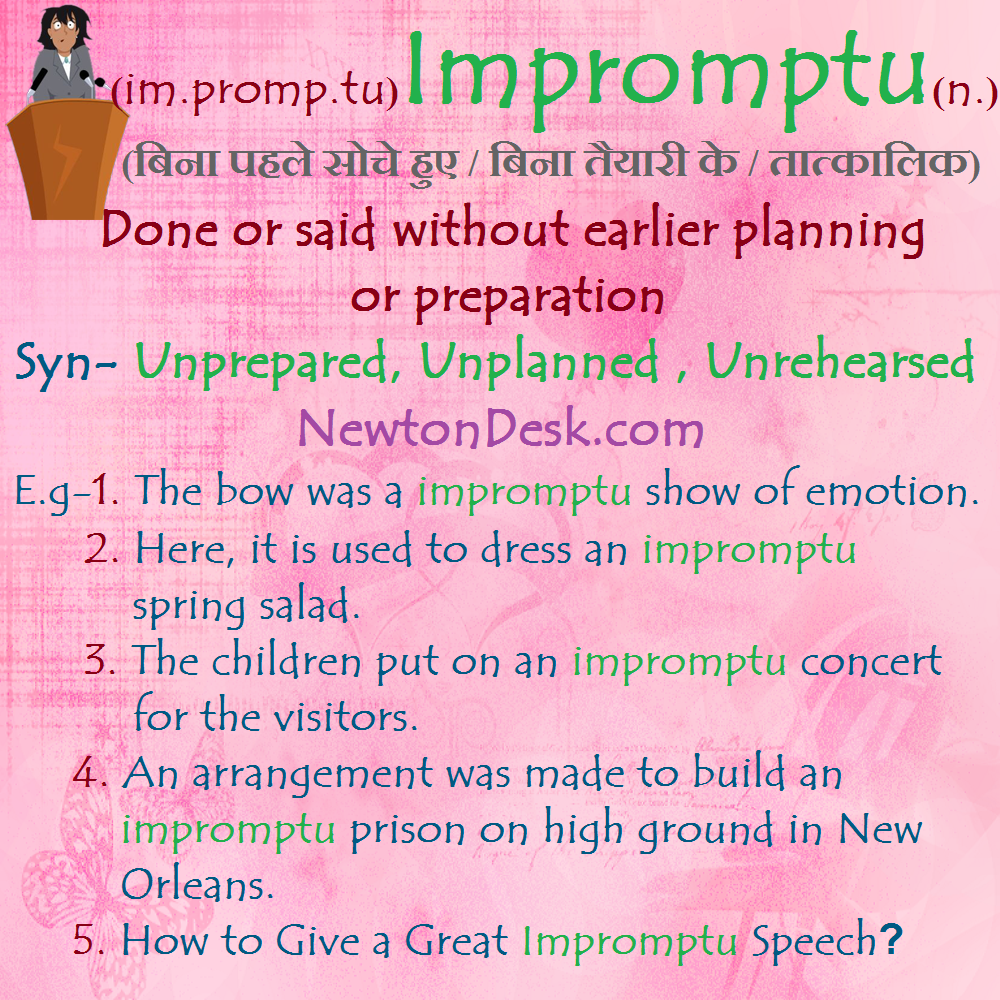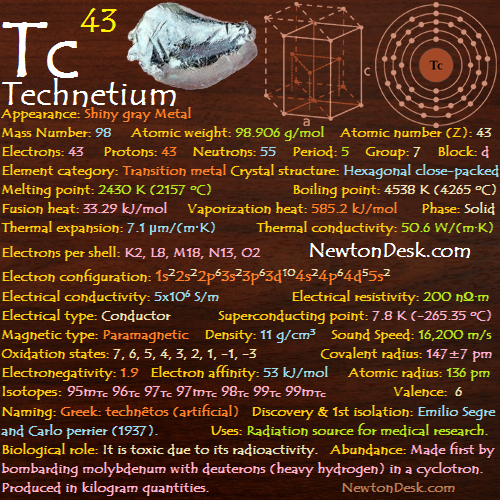AP Chemistry stands for Advanced Placement Chemistry. In American and Canadian high schools, the Advanced Placement Program has a College Board that offers courses and conduct AP Chemistry exam. AP Chemistry Exam helps students to earn college-level credits.
AP Chemistry CED (AP Chemistry Course and Exam Description)
AP Chemistry syllabus includes General Chemistry (except Organic Chemistry), AP Chemistry exam has a duration of one year in 2 semesters. And both semesters, have the same AP Chemistry syllabus. The AP Chemistry course includes 9 units.
| AP CHEMISTRY UNITS | UNIT | TOPICS | WEIGHTAGE |
| AP Chemistry Unit 1 | ATOMIC STRUCTURE AND PROPERTIES | 1) Moles and Molar Mass | 7%-9% |
| 2) Mass Spectroscopy of Elements | |||
| 3) Elemental Composition of Pure Substances | |||
| 4) Composition of Mixtures | |||
| 5) Atomic Structure and Electron Configuration | |||
| 6) Photoelectron Spectroscopy | |||
| 7) Periodic Trends | |||
| 8) Valence Electrons and Ionic Compounds | |||
| AP Chemistry Unit 2 | MOLECULAR AND IONIC COMPOUND STRUCTURE AND PROPERTIES | 1) Types of Chemical Bonds | 7%-9% |
| 2) Intramolecular Forces and Potential Energy | |||
| 3) Structure of Iconic Solids | |||
| 4) Structure of Metals and Alloys | |||
| 5) Lewis Diagrams | |||
| 6) Resonance and Formal Charge | |||
| 7) VSEPR and Bond Hybridization | |||
| AP Chemistry Unit 3 | INTERMOLECULAR FORCES AND PROPERTIES | 1) Intermolecular Forces | 18%-22% |
| 2) Properties of Solids | |||
| 3) Solids, Liquids, and Gases | |||
| 4) Ideal Gas Law | |||
| 5) Kinetic Molecular Theory | |||
| 6) Deviation from Ideal Gas Law | |||
| 7) Solutions and Mixtures | |||
| 8) Representations of Solutions | |||
| 9) Separation of Solutions and Mixtures Chromatography | |||
| 10) Solubility | |||
| 11) Spectroscopy and Electromagnetic Spectrum | |||
| 12) Photoelectric Effect | |||
| 13) Beer-Lambert Law | |||
| AP Chemistry Unit 4 | CHEMICAL REACTIONS | 1) Introduction for Reactions | 7%-9% |
| 2) Net Ionic Equations | |||
| 3) Representations of Reactions | |||
| 4) Physical and Chemical Changes | |||
| 5) Stoichiometry | |||
| 6) Introduction to Titration | |||
| 7) Types of Chemical Reactions | |||
| 8) Introduction to Acid-Base Reactions | |||
| 9) Oxidation-Reduction (Redox) Reactions | |||
| AP Chemistry Unit 5 | KINETICS | 1) Reaction Rates | |
| 2) Introduction to Rate Law | |||
| 3) Concentration Changes Over Time | |||
| 4) Elementary Reactions | |||
| 5) Collision Model | |||
| 6) Reaction Energy Profile | |||
| 7) Introduction to Reaction Mechanisms | |||
| 8) Reaction Mechanism and Rate Law | |||
| 9) Steady-State Approximation | |||
| 10) Multistep Reaction Energy Profile | |||
| 11) Catalysis | |||
| AP Chemistry Unit 6 | THERMODYNAMICS | 1) Endothermic and Exothermic Processes | 7%-9% |
| 2) Energy Diagrams | |||
| 3) Heat Transfer and Thermal Equilibrium | |||
| 4) Heat Capacity and Calorimetry | |||
| 5) Energy of Phase Changes | |||
| 6) Introduction to Enthalpy of Reaction | |||
| 7) Bond Enthalpies | |||
| 8) Enthalpy of Formation | |||
| 9) Hess’s Law | |||
| AP Chemistry Unit 7 | EQUILIBRIUM | 1) Introduction to Equilibrium | 7%-9% |
| 2) Direction of Reversible Reactions | |||
| 3) Reaction Quotient and Equilibrium Constant | |||
| 4) Calculating the Equilibrium Constant | |||
| 5) Magnitude of the Equilibrium Constant | |||
| 6) Properties of the Equilibrium Constant | |||
| 7) Calculating Equilibrium Concentrations | |||
| 8) Representations of Equilibrium | |||
| 9) Introduction to Le Châtelier’s Principle | |||
| 10) Reaction Quotient and Le Châtelier’s Principle | |||
| 11) Introduction to Solubility Equilibria | |||
| 12) Common-Ion Effect | |||
| 13) pH and Solubility | |||
| 14) Free Energy of Dissolution | |||
| AP Chemistry Unit 8 | ACIDS AND BASES | 1) Introduction to Acids and Bases | 11%-15% |
| 2) pH and pOH of Strong Acids and Bases | |||
| 3) Weak Acid and Base Equilibrium | |||
| 4) Acid-Base Reactions and Buffers | |||
| 5) Acid-Base Titrations | |||
| 6) Molecular Structure of Acids and Bases | |||
| 7) pH and pKa | |||
| 8) Properties of Buffers | |||
| 9) Henderson-Hasselbalch Equation | |||
| 10) Buffer Capacity | |||
| AP Chemistry Unit 9 | APPLICATIONS OF TERMODYNAMICS | 1) Introduction to Energy | 7%-9% |
| 2) Absolute Entropy and Entropy Change | |||
| 3) Gibbs Free Energy and Thermodynamics Favorability | |||
| 4) Thermodynamic and Kinetic Control | |||
| 5) Free Energy and Equilibrium | |||
| 6) Coupled Reactions | |||
| 7) Galvanic (Volcanic) and Electrolytic Cells | |||
| 8) Cell Potential and Free Energy | |||
| 9) Cell Potential Under Nonstandard Conditions | |||
| 10) Electrolysis and Faraday’s Law |
AP Chemistry Grading Scale
AP Chemistry includes Grades 1 to 5 on the Grading Scale. Grade 5 is considered the best. Grade 3 is for qualifying the exam.
The exam pattern in AP Chemistry- The time duration of AP Chemistry exam is 3 hours and 15 minutes which includes 2 sections.
Section A: AP Chemistry Multiple Choice Questions (AP Chemistry MCQs)
Multiple Choice Questions-
- This section includes 50% of exam scores.
- It includes a total of 60 questions in two parts.
- Total score is 60 points. 1 point for each correct answer.
- The duration of time is 1 hour 30 minutes.
Section B: AP Chemistry Free Response Questions (AP Chemistry FRQ)
Free Response Questions-
- This section includes the 50% exam score.
- The duration of time is 1 hour 45 minutes.
- The total score is 46 points.
- This section includes 7 free response questions(FRQs) in two parts –
- Short Answer: 4 questions with 4 points each.
- Long- essay: 3 questions with 10 points each.
In simple words, the AP Chemistry Exam has two parts: one with multiple-choice questions, and the other with Free Response Questions or written answers. Both parts together make your final score.
5 Steps to get a 5 AP Chemistry
- First, you have to go through the AP Chemistry syllabus, which is mentioned above.
- Second, solve the AP Chemistry past papers. Get an idea of the AP Chemistry exam pattern. Now, focus on AP Chemistry key concepts.
- Third, make the best study timetable to ace an exam. You can go through the
- Fourth, solve lots of AP Chemistry practice tests, and AP Chemistry exam questions. Always ask why the correct answer is correct and the concept behind it and memorize all the formulas.
- Revise your AP Chemistry notes which you made during self-study AP Chemistry or AP Chemistry online course. Also, you have to revise AP Chemistry Organic Chemistry; you can go through a Next, revise the AP Chemistry periodic table, you can go through the “Periodic Table“.
Best Chemistry Aesthetic Study Notes Bundle
DOUBTFUL QUERIES
What is the use of the AP Chemistry Exam?
AP Chemistry Exam helps to earn college-level credits and also, get familiar with the fundamental concepts.
When should I take the AP Chemistry Exam?
Students in high school like in Grade 11th or Grade 12th should take the AP Chemistry Exam.
Is AP Chemistry worth it?
Yes, well you earned credit points which would elevate your academic results. And also, you understood the fundamental concepts in Chemistry.
When is the AP Chemistry Exam 2024?
In May 2024, the AP Chemistry Exam will be held.
What to do after AP Chemistry?
Earn good credit in AP Chemistry exam, and then go for higher education. Also, it swaps out to take decisions for specialization in Computer software engineering, Astronomy, Electrical engineering, Industrial engineering and management, Forensic engineering, Materials engineering, and healthcare.
Is Pre-AP Chemistry is hard?
Pre-AP Chemistry helps to connect core ideas and a glimpse of the AP Chemistry units. Thus, it assesses the students between what they know and in what area they need to focus. It’s an easier thing to understand in AP Chemistry.
How difficult is AP Chemistry?
AP Chemistry covers the General Chemistry (excluding Organic Chemistry). It delves into the fundamental topics to understand the concept.
How to prepare for AP Chemistry over the summer?
Contact the team of educators who facilitates Pre-AP Summer Institutes. You can work with the College Board about the course resources.
How long is AP Chemistry?
AP Chemistry is 1 year course with 2 semesters.
What Grade in AP Chemistry?
Grade 3 is passing and Grade 5 considers the best.
Is AP Chemistry harder than AP Biology?
- Students perform experiments in AP Chemistry lab requirements and learn various processes and easy to remember. While in AP Biology, there are a lot of experiments about plant science and human science.
- AP Chemistry needs to memorize the formulas, understand the Thermodynamic concepts, AP Chemistry Stoichiometry, while AP Biology includes memorization, solving puzzles and applications.
- AP Chemistry includes Algebra, while AP Biology has Statistics.
- The time duration of AP Chemistry is 3 hours and 15 minutes, while AP Biology is 3 hours.
What is the passing rate for AP Chemistry?
Grade 3 is the passing grade.
How many questions are in the AP Chemistry Exam?
It consists in 2 parts. First, in MCQs with 60 questions, and Second, in Free Response Questions (FRQs) with 7 questions are there.
AP Chemistry for Dummies?
AP Chemistry exam is organized under Advanced Placement Program by the College Board. Dummies can contact these teachers and can take the exam.
Prerequisites for AP Chemistry?
Students have complete their high school chemistry course and algebra. Also, AP Chemistry lab requirements are a must to take the exam.
Fiveable AP Chemistry?
Fiveable AP Chemistry includes study sessions with other students and getting reviews on every topic.
What does AP Chemistry Exam cover?
AP Chemistry course includes General Chemistry (excluding Organic Chemistry).
What is AP Chemistry equivalent to in college?
Students earns a college credit in AP Chemistry is equivalent to a first-year college-level foundation course in Chemistry.
How to self-study AP Chemistry?
Firstly, understand the AP Chemistry course and exam description (CED). Secondly, make self-study notes including AP Chemistry important concepts or formulas with what you have AP Chemistry resources or attending the AP Chemistry online tutor. Next, revise timely and memorize the formulas (like AP Chemistry formula sheets). Lastly, practice more AP Chemistry questions.
Here, you can get the details of the AP Chemistry Exam. By following some important steps and guidelines, students can crack the exam and earn college-level credits. Just focus on important stuffs rather than wasting your time. Also, believe in yourself, hard work with smartly gives you blissful reactions.
Riya utwal



